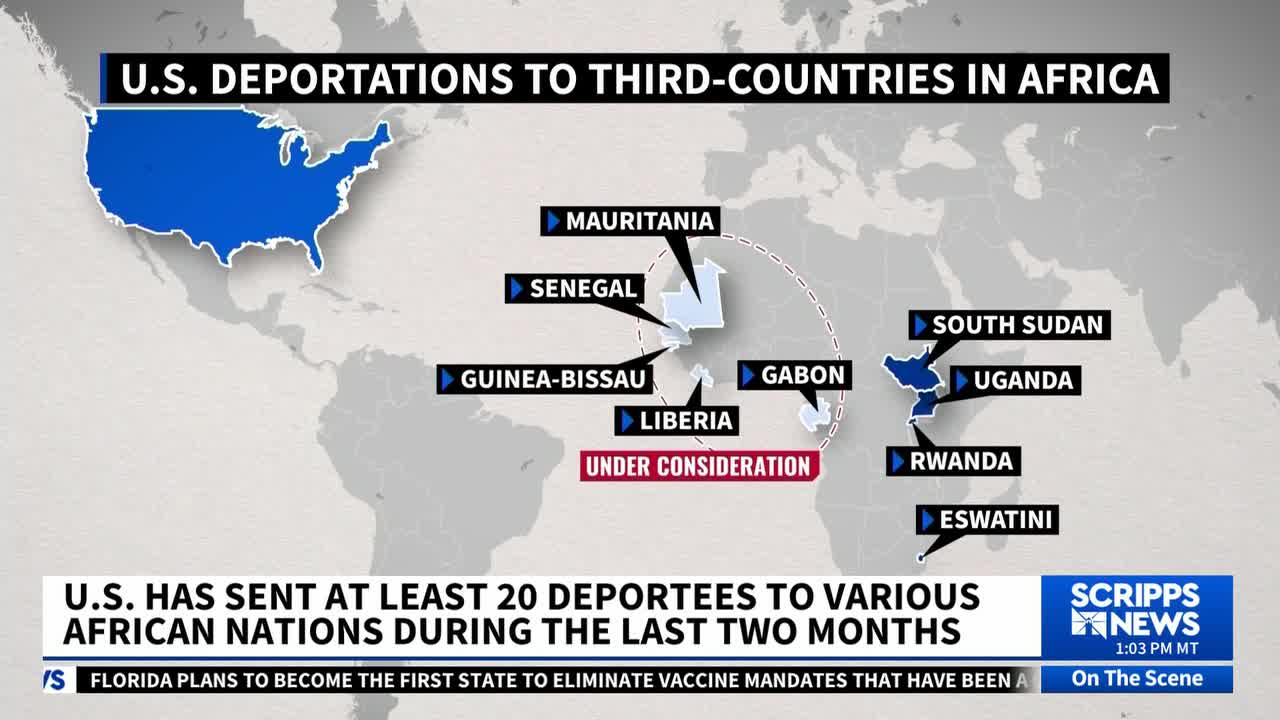In the past two months, U.S. immigration lawyers have reported that at least 20 individuals have been deported to various African countries, with several being held in maximum-security prisons despite facing no criminal charges.
Legal aid attorneys in New York say five deportees from the U.S. were sent to Eswatini, where they are being illegally imprisoned.
"My two clients have been imprisoned in Eswatini, at U.S. taxpayer expense, for over six weeks," said Alma David, a U.S.-based attorney for the two men who are from Yemen and Cuba, in a statement sent to Scripps News. "No one has told them why they are being detained, and no lawyer has been permitted to visit them."
RELATED STORY | Democrat-led cities are under a mass deportation threat
One of the deportees has been identified as a Jamaican national who came to the U.S. legally and was convicted of murder. Despite completing his 25-year sentence, the 62-year-old was deported to Eswatini. He had been working in a men's shelter at the time and wasn't accused of any new crimes.
Eswatini is among several African nations that have entered agreements with the U.S. to accept non-citizen deportees. Other countries involved include Rwanda, South Sudan, and Uganda, each seen as part of a program that has largely operated in secrecy. Several other African nations are reportedly considering similar agreements.
Ariel Ruiz Soto, a Senior Policy Analyst at the Migration Policy Institute, told Scripps News Group that while third-country deportations are not new, the current administration is focusing on deporting individuals to more locations at an accelerated rate.
ADDITIONAL REPORTING | Supreme Court allows Trump to deport migrants away from their home countries
"The key concern is not just the number of people being sent to third countries where they are not from, but also that they are not necessarily given the review and due process to consider their protection or asylum claims," Soto said.
Defending this process in a statement to Scripps News, a senior Department of Homeland Security official said, "The average illegal alien gets far more due process than most Americans. The fact of the matter is those who are in our country illegally have a choice—they can leave the country voluntarily or be arrested and deported."
Human rights and legal advocates argue this expedited deportation process may result in individuals being sent to countries deemed unsafe, potentially violating international law.
As the Trump administration approaches additional nations for third-country deportation agreements, some have declined. Nigeria's Foreign Minister pointed to the country's population of 230 million people, saying the nation has problems of its own.
IN CASE YOU MISSED IT | Judge blocks Trump administration's plan to deport Kilmar Abrego Garcia to Uganda
Meanwhile, some nations have countered with stipulations of their own. Uganda has said it will not accept deportees with criminal records or unaccompanied minors.
"A lot of these countries that are receiving third-country nationals have in their negotiations the clause to not receive immigrants who have a criminal past or some sort of criminal background, and that is in counter to what the Trump administration is suggesting that they're focusing on criminals who are the most violent of them all," Soto said.





